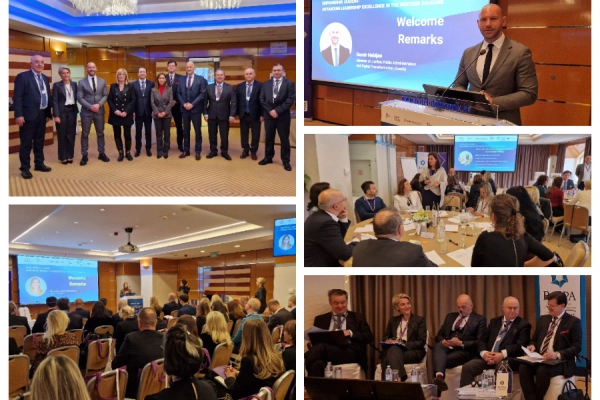
Empowering Leadership for a Resilient Future: Advancing Public Administration Excellence in the Western Balkans
3-5 December 2024, Zagreb, Croatia
Jointly organized by the ReSPA and the National School of Public Administration of Croatia (NSPA), in partnership with the French National Institute of Public Service (INSP), and the French Embassy in Zagreb, the conference brought together leaders, experts, and stakeholders from across the Western Balkans and Europe to focus on advancing leadership capacities within public administration.
Participants explored the transformative role of leadership development, discussing frameworks, competency models, and training formats. Real-world insights were shared from the French-Croatian Leadership Project, alongside contributions from other regional and international initiatives. Through expert-led presentations and interactive group sessions, the Conference focused on global challenges like climate change, digitalization, and EU integration. Key objectives were to enhance leadership competencies and foster regional cooperation. The conference also worked towards creating a roadmap for sustainable leadership training initiatives in the Western Balkans.
The conference began with a series of introductory speeches by distinguished officials, including Damir Habijan, Minister of Justice, Public Administration, and Digital Transformation; Anamarija Badovinac, Deputy Head of the Legislation Office of the Government of Croatia; H.E. Mr Fabien Fieschi, Ambassador of France to Croatia; Rudolf Vujević, Director of the NSPA; Maja Handjiska-Trendafilova, Director of ReSPA; Frédéric Rauser, Director of International Relations at INSP; and Vassileios Exarchos, Vice-President of the Greek National Centre for Public Administration and Local Government (EKDDA). They highlighted the pivotal role of leadership in fostering resilient and innovative public administrations capable of addressing global challenges.
Director Handjiska-Trendafilova underlined "This event is not just an opportunity to explore critical topics like leadership and public administration transformation amidst societal and geopolitical shifts; it is a testament to the power of international and regional collaboration. By leveraging good practices from Croatia, France, Greece, and the Western Balkans, we bridge EU expertise with regional realities, driving tangible progress toward European integration. ReSPA proudly catalyzes such cooperation, fostering dialogue, knowledge-sharing, and capacity-building to empower our administrations to navigate challenges and create a more resilient, innovative, and citizen-centric future."
During the first session: Lessons from the French-Croatian Leadership Program participants delved into the objectives and lessons learned from the French-Croatian Leadership Program. Panelists included Prof. Jean-Michel Eymeri-Douzans, Deputy Director of PO Toulouse; Jacques Skowron, Senior Expert in Strategic and Operational Management; Frédéric Rauser of INSP; and Valentina Miličić, Assistant Director of NSPA. Moderated by Philippe Sibeaud, Project Manager at INSP, the session explored the INSP approach to training senior managers, challenges faced during the program, and suggestions for improving leadership syllabi. First-hand testimonies from trainees enriched the discussion, providing insights into the program's impact.
The second session Models of Leadership Training focused on diverse models of leadership training from Greece, France, and the Western Balkans. Athanasios Raptis, Director of EKDDA, presented the ongoing reform of the Greek public training system. Prof. Jean-Michel Eymeri-Douzans and Jacques Skowron elaborated on INSP's Executive Programme, while Ajda Turk from the CEF shared insights into the WeLead project aimed at young public officials.
Day 1 concluded with a session Regional Leadership in a Globalized World moderated by Ranka Bartula-Mušikić from ReSPA, featuring leaders from Albania, Bosnia and Herzegovina, Montenegro, North Macedonia, Serbia, and Kosovo*. The panelists discussed regional approaches to leadership development, competencies needed to tackle global challenges, and strategies to prepare Western Balkan leaders for EU integration and beyond.
Day 2 was marked by interactive World Café sessions where participants collaborated on key themes such as designing effective leadership training, enhancing competency models, and preparing leaders for future challenges. The results of these discussions were presented, forming the foundation for a roadmap to guide future leadership initiatives in the region.
This conference stands out as a significant milestone in leadership development, setting the stage for enhanced cooperation and capacity-building in the Western Balkans public administration. With ReSPA’s pivotal role, the event underscored the importance of collaborative efforts in shaping a resilient and future-ready administrative framework for the region.



